2022年九年级中考英语语法解析 代词
图片预览
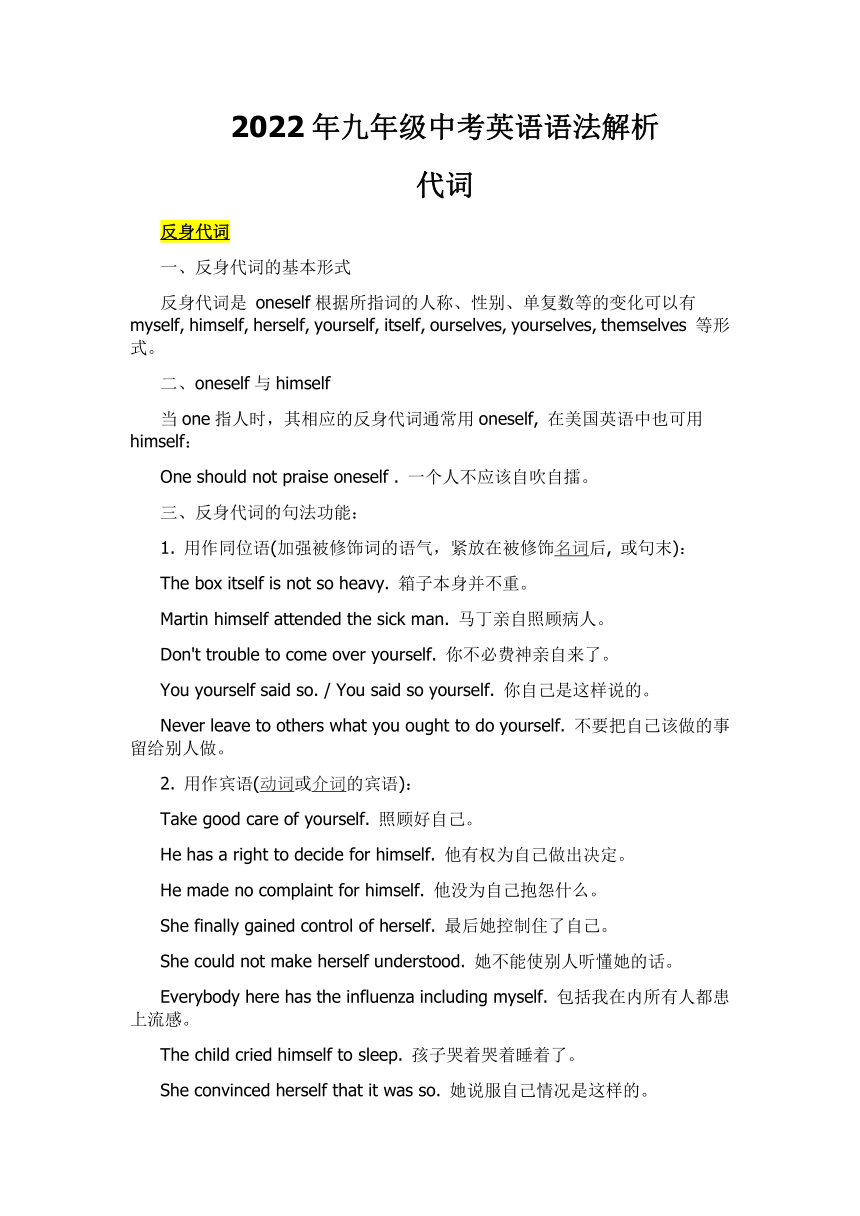
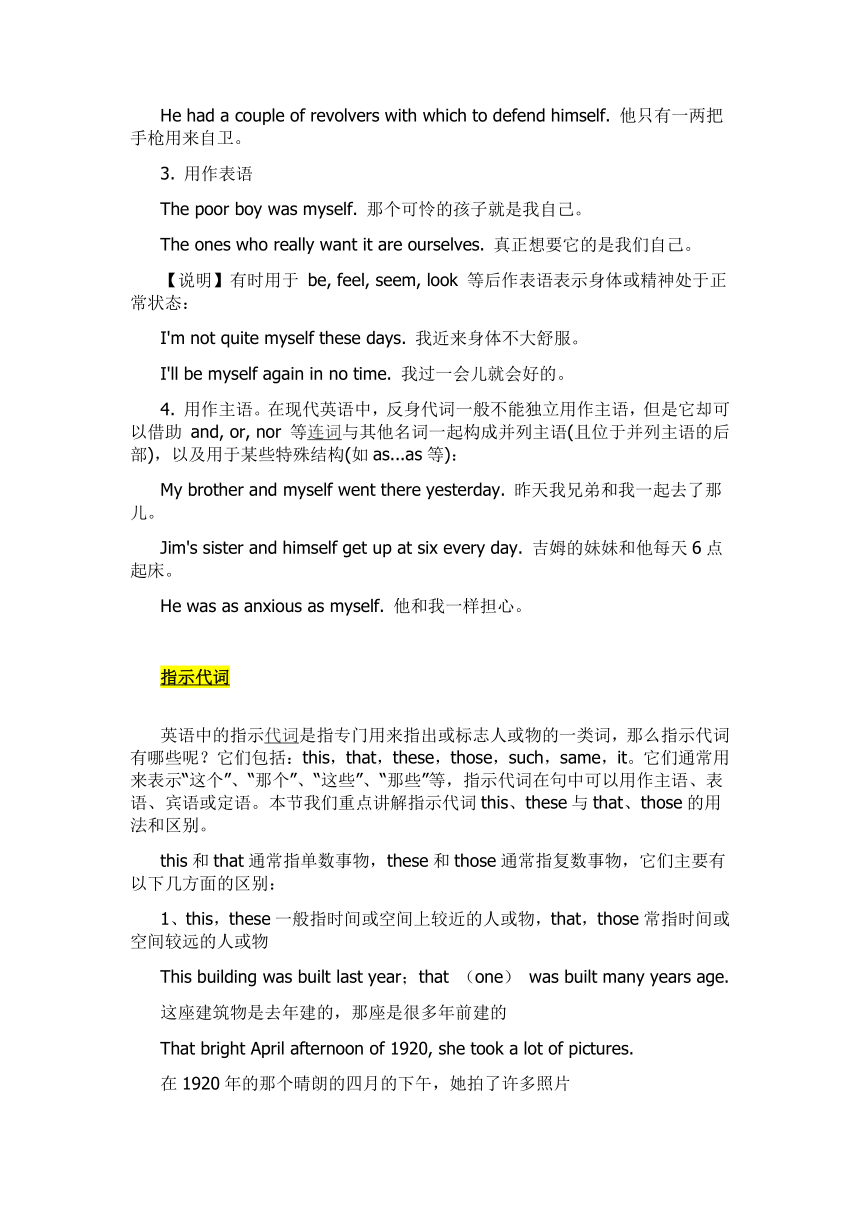
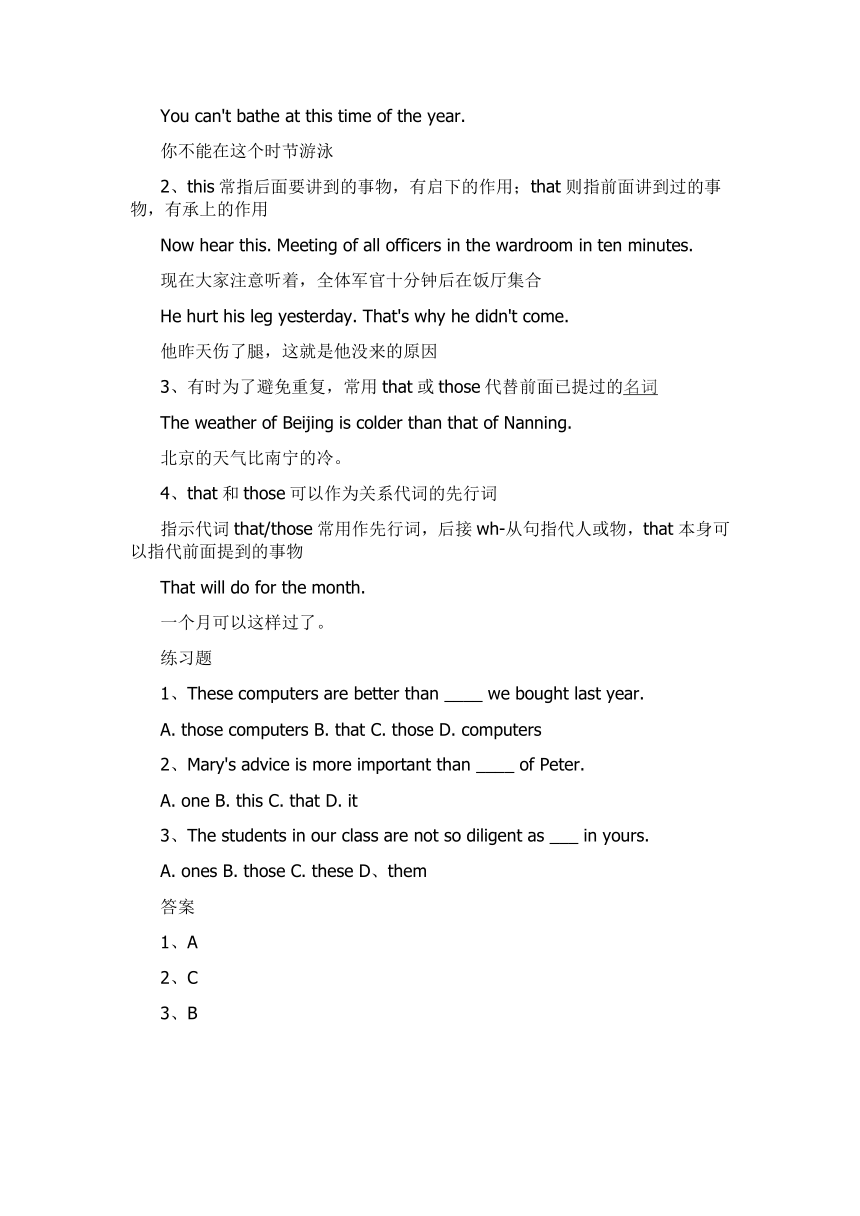
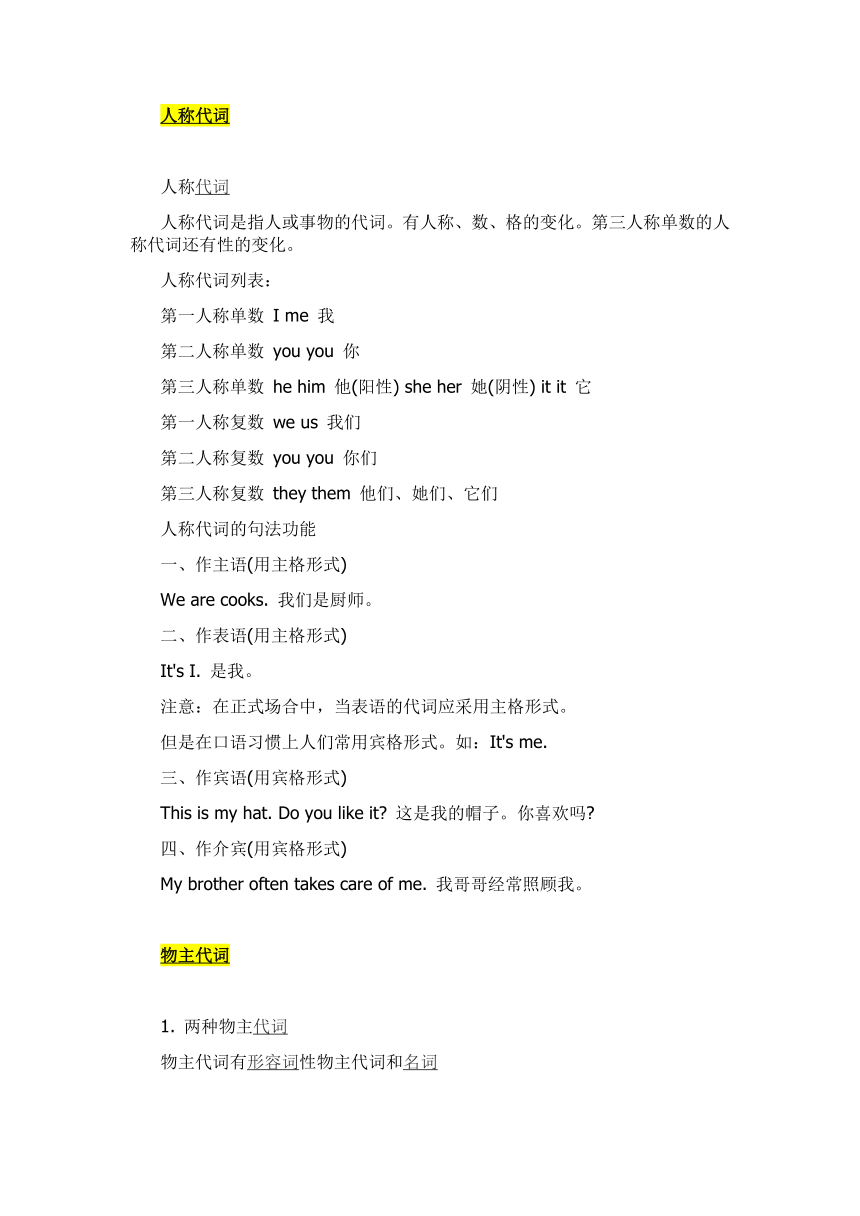
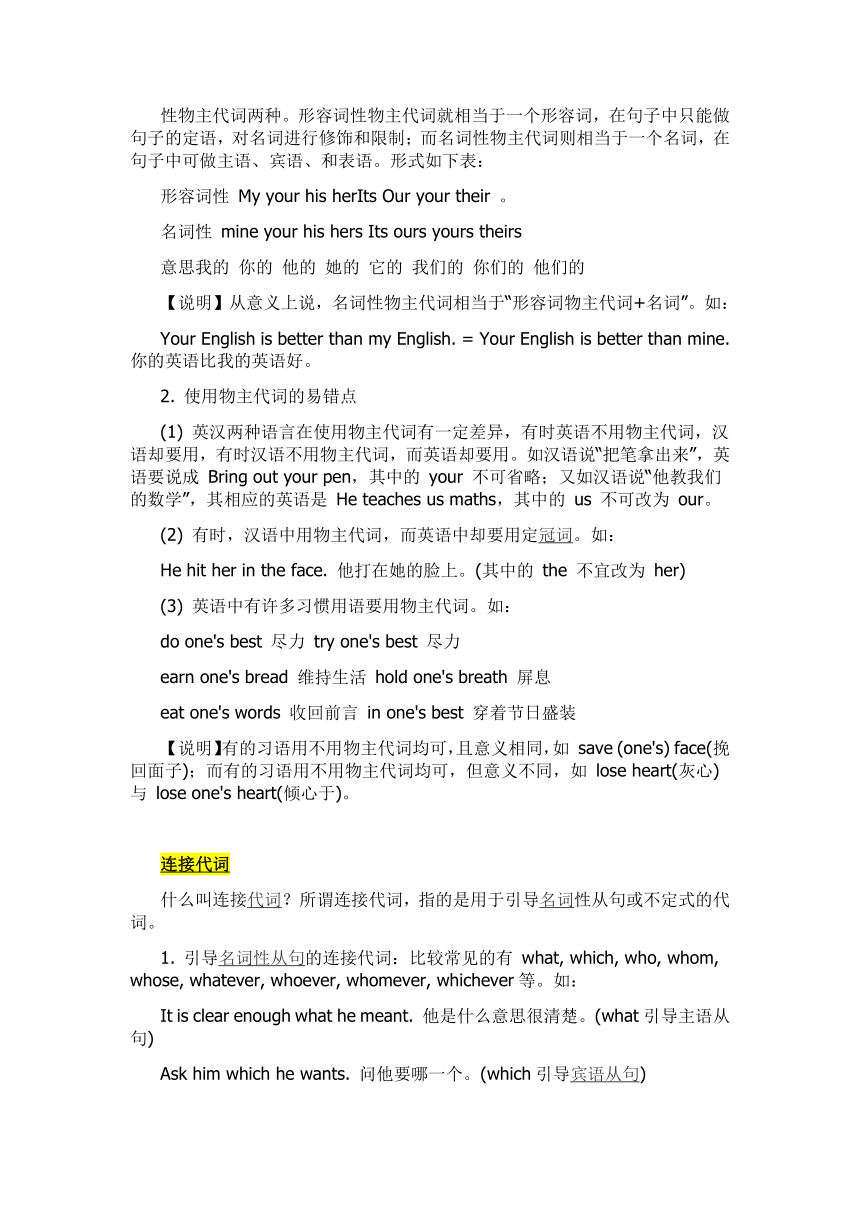
文档简介
2022年九年级中考英语语法解析
代词
反身代词
一、反身代词的基本形式
反身代词是 oneself根据所指词的人称、性别、单复数等的变化可以有 myself, himself, herself, yourself, itself, ourselves, yourselves, themselves 等形式。
二、oneself与himself
当one指人时,其相应的反身代词通常用oneself, 在美国英语中也可用himself:
One should not praise oneself . 一个人不应该自吹自擂。
三、反身代词的句法功能:
1. 用作同位语(加强被修饰词的语气,紧放在被修饰名词后, 或句末):
The box itself is not so heavy. 箱子本身并不重。
Martin himself attended the sick man. 马丁亲自照顾病人。
Don't trouble to come over yourself. 你不必费神亲自来了。
You yourself said so. / You said so yourself. 你自己是这样说的。
Never leave to others what you ought to do yourself. 不要把自己该做的事留给别人做。
2. 用作宾语(动词或介词的宾语):
Take good care of yourself. 照顾好自己。
He has a right to decide for himself. 他有权为自己做出决定。
He made no complaint for himself. 他没为自己抱怨什么。
She finally gained control of herself. 最后她控制住了自己。
She could not make herself understood. 她不能使别人听懂她的话。
Everybody here has the influenza including myself. 包括我在内所有人都患上流感。
The child cried himself to sleep. 孩子哭着哭着睡着了。
She convinced herself that it was so. 她说服自己情况是这样的。
He had a couple of revolvers with which to defend himself. 他只有一两把手枪用来自卫。
3. 用作表语
The poor boy was myself. 那个可怜的孩子就是我自己。
The ones who really want it are ourselves. 真正想要它的是我们自己。
【说明】有时用于 be, feel, seem, look 等后作表语表示身体或精神处于正常状态:
I'm not quite myself these days. 我近来身体不大舒服。
I'll be myself again in no time. 我过一会儿就会好的。
4. 用作主语。在现代英语中,反身代词一般不能独立用作主语,但是它却可以借助 and, or, nor 等连词与其他名词一起构成并列主语(且位于并列主语的后部),以及用于某些特殊结构(如as...as等):
My brother and myself went there yesterday. 昨天我兄弟和我一起去了那儿。
Jim's sister and himself get up at six every day. 吉姆的妹妹和他每天6点起床。
He was as anxious as myself. 他和我一样担心。
指示代词
英语中的指示代词是指专门用来指出或标志人或物的一类词,那么指示代词有哪些呢?它们包括:this,that,these,those,such,same,it。它们通常用来表示“这个”、“那个”、“这些”、“那些”等,指示代词在句中可以用作主语、表语、宾语或定语。本节我们重点讲解指示代词this、these与that、those的用法和区别。
this和that通常指单数事物,these和those通常指复数事物,它们主要有以下几方面的区别:
1、this,these一般指时间或空间上较近的人或物,that,those常指时间或空间较远的人或物
This building was built last year;that (one) was built many years age.
这座建筑物是去年建的,那座是很多年前建的
That bright April afternoon of 1920, she took a lot of pictures.
在1920年的那个晴朗的四月的下午,她拍了许多照片
You can't bathe at this time of the year.
你不能在这个时节游泳
2、this常指后面要讲到的事物,有启下的作用;that则指前面讲到过的事物,有承上的作用
Now hear this. Meeting of all officers in the wardroom in ten minutes.
现在大家注意听着,全体军官十分钟后在饭厅集合
He hurt his leg yesterday. That's why he didn't come.
他昨天伤了腿,这就是他没来的原因
3、有时为了避免重复,常用that或those代替前面已提过的名词
The weather of Beijing is colder than that of Nanning.
北京的天气比南宁的冷。
4、that和those可以作为关系代词的先行词
指示代词that/those常用作先行词,后接wh-从句指代人或物,that本身可以指代前面提到的事物
That will do for the month.
一个月可以这样过了。
练习题
1、These computers are better than ____ we bought last year.
A. those computers B. that C. those D. computers
2、Mary's advice is more important than ____ of Peter.
A. one B. this C. that D. it
3、The students in our class are not so diligent as ___ in yours.
A. ones B. those C. these D、them
答案
1、A
2、C
3、B
人称代词
人称代词
人称代词是指人或事物的代词。有人称、数、格的变化。第三人称单数的人称代词还有性的变化。
人称代词列表:
第一人称单数 I me 我
第二人称单数 you you 你
第三人称单数 he him 他(阳性) she her 她(阴性) it it 它
第一人称复数 we us 我们
第二人称复数 you you 你们
第三人称复数 they them 他们、她们、它们
人称代词的句法功能
一、作主语(用主格形式)
We are cooks. 我们是厨师。
二、作表语(用主格形式)
It's I. 是我。
注意:在正式场合中,当表语的代词应采用主格形式。
但是在口语习惯上人们常用宾格形式。如:It's me.
三、作宾语(用宾格形式)
This is my hat. Do you like it 这是我的帽子。你喜欢吗
四、作介宾(用宾格形式)
My brother often takes care of me. 我哥哥经常照顾我。
物主代词
1. 两种物主代词
物主代词有形容词性物主代词和名词
性物主代词两种。形容词性物主代词就相当于一个形容词,在句子中只能做句子的定语,对名词进行修饰和限制;而名词性物主代词则相当于一个名词,在句子中可做主语、宾语、和表语。形式如下表:
形容词性 My your his herIts Our your their 。
名词性 mine your his hers Its ours yours theirs
意思我的 你的 他的 她的 它的 我们的 你们的 他们的
【说明】从意义上说,名词性物主代词相当于“形容词物主代词+名词”。如:
Your English is better than my English. = Your English is better than mine. 你的英语比我的英语好。
2. 使用物主代词的易错点
(1) 英汉两种语言在使用物主代词有一定差异,有时英语不用物主代词,汉语却要用,有时汉语不用物主代词,而英语却要用。如汉语说“把笔拿出来”,英语要说成 Bring out your pen,其中的 your 不可省略;又如汉语说“他教我们的数学”,其相应的英语是 He teaches us maths,其中的 us 不可改为 our。
(2) 有时,汉语中用物主代词,而英语中却要用定冠词。如:
He hit her in the face. 他打在她的脸上。(其中的 the 不宜改为 her)
(3) 英语中有许多习惯用语要用物主代词。如:
do one's best 尽力 try one's best 尽力
earn one's bread 维持生活 hold one's breath 屏息
eat one's words 收回前言 in one's best 穿着节日盛装
【说明】有的习语用不用物主代词均可,且意义相同,如 save (one's) face(挽回面子);而有的习语用不用物主代词均可,但意义不同,如 lose heart(灰心)与 lose one's heart(倾心于)。
连接代词
什么叫连接代词?所谓连接代词,指的是用于引导名词性从句或不定式的代词。
1. 引导名词性从句的连接代词:比较常见的有 what, which, who, whom, whose, whatever, whoever, whomever, whichever等。如:
It is clear enough what he meant. 他是什么意思很清楚。(what引导主语从句)
Ask him which he wants. 问他要哪一个。(which引导宾语从句)
The problem is who can be put in charge of the work. 问题是谁能来负责此事。(who引导表语从句)
Whoever comes will be welcome. 任何人来都欢迎。(whoever引导主语从句)
Buy whichever is cheapest. 买最便宜的。(whichever引导宾语从句)
I'll just say whatever comes into my head. 我将想到什么说什么。(whatever引导宾语从句)
2. 连接代词除用于引导名词性从句外,有时也可引导不定式。如:
I ask him what to do. 我问他该怎么办。
Show me what to do. 给我说说该做什么。
Did you ask her which to buy 你问没问她该买哪一个
He doesn't know whom to believe. 他不知该相信谁。
这类用法通常可视为名词性从句的省略。如:
I wonder who to invite. =I wonder who I should invite. 我拿不定该邀请谁。
复合不定代词
1、含有-one和-body的不定代词功能和意义基本相同,含有-one的不定代词比含有-body的不定代词正式。
2、所有不定代词都当作单数对待。
Someone is asking to see you. / Nobody is absent.
3、带有some的复合不定代词一般用于肯定句,带有any的复合不定代词一般用于否定句和疑问句。
Someone suggests putting off the meeting.
Did you meet anyone on your way home.
★含有some的复合不定代词也可以用于疑问句中,表示肯定的的意思。含有any的复合不定代词也可以用于肯定句中表示“任何人”或“任何事”。
Why don't you say something Anybody can go.
4、somebody和nobody可以表示“重要人物”和“小人物”的意思。
He thinks himself a somebody, but he is nobody.
5、else和形容词作复合不定代词的定语时都要后置。
He wanted to read something interesting.
He wants to see nobody else.
不定代词
不定代词种类较多,用法各异,在使用中一定要注意区别。
1、both,either ,neither 都表两者范围,在句中作主语、宾语、定语 ,both可用作同位语。both 意为"两者都",either 表"两者中任一个",neither表"两者都不"。
2、any,none ,all 表三者或三者以上范围,any 表任何一个、一些(不可数或复数概念,用于否定句、疑问句或条件从句中);none 表三者或三者以上中的哪一个都不;表示不可数物中的一点儿也没有;all 整个的;所有的(三者或三者以上);所有的(不可数)。
e.g.This book is a good seller,so you can buy it at any shop in Beijing./ None of us are/is perfect./ All of the village was flooded.
3、no one,nobody,none,nothing:no one,nobody表没有人,nothing 指没有什么事物,none 兼指人和物。none 着眼于数量概念。"特指的人或物一个也没有,一点儿也没有"。
—How many people are there in the hall —None.
—who wants to go with him —No one(Nobody).
—What can you see in the bottle —Nothing.
—Is there any water in it —None.
4、another,the other,the other+复数名词(或the others),other (或other +复数名词):another 表三者或三者以上范畴中的任一;与数词连用,表"再有";the other 表两者中的另外那个,特指;the other+复数名词(或the others),另外那些,表示其余所有的人或物,用于特指;others (或other+复数名词)另一些,表余下人或物中的另一些,泛指。
—I don't like this,show me another one.
If you want to change for a double room you'll have to pay_______$15.
A.another B.other C.more D.Each (A)
不定代词neither、either、both的用法
1、Neither的用法
1)代词。意为“两者中任何一方都不”both的反义词,作主语时谓语动词用单数。
Neither of the books is mine.
这两本书没有一本是我的。
2)形容词。修饰名词时,名词使用单数。
Neither boy can swim.
两个男孩都不会游泳。
3)连词。Neither与nor连用:neither—nor— 意为“既不——也不——”连接两个并列的句子成分(连接主语时,谓语动词就近选择)
Neither he nor I am a teacher.
他和我都不是老师。
2、Either的用法
1)代词。意为“两者中的任何一个”谓语动词用单数。
Either of us is a student.
2)形容词。修饰名词时,名次使用单数。
Either boy can swim.
两个男孩中有一个会游泳。
3)连词。与or连用:either…or….意为“不是—就是—,要么—要么—,或者—或者—”连接两个并列的句子成分(连接主语时,谓语动词就近选择)用在否定句中和意思与neither nor 一样。
Either you or I am wrong.不是你错了就是我错了。
He doesn't know German or French.=He knows neither German nor French.
3、Both的用法
1)代词。意为“两者都”和谓语动词连用时,放在行为动词前,语法词之后。与of 连用作主语时,谓语动词用复数。
We must both study English well.
Both of us are from America.=We are both Americans.
2)形容词。修饰名词时,名次使用单数。
There are many trees on the both sides of the road.
3)连词。both and连用。意为“——两者都——”连接主语时谓语动词用复数。
Both my brother and I are football players.
这些词都可用作代词或形容词。其位置都在be 动词之后,行为动词之前或第一助动词之后。
二、neither、either、both的区别
neither、either、both的区别有以下几种情况:
1、 both (两者都),either(两者中任何一个), neither (两者都不)。以上词使用范围为两个人或物。
Neither of the two boys is clever. 两个男孩都不聪明。
2、both,either
both与复数连用,either与单数连用。
Both the boys are clever. 两个男孩都很聪明。
Either of the two boys is clever. 两个男孩都很聪明。
There are flowers on both sides of the street.(两岸)
There are flowers on either side of the street.(岸的两边)
路边长满了野花。
3、either指两者中的任何一个,neither指两者都不。作代词时,either, neither一般接单数动词。作限定词时,一般加单数名词。
例:
Either of them will be appointed Minister of Finance.Neither of the two speaks English well.You must not favor either side in the dispute.In neither case can I agree with you.
4、either…or表示两个或多个选择中的一项。neither…nor表示“既不,也不”。either…or, neither…nor连接的两个名词或代词作主语时,谓语动词与最靠近它的主语一致。
例:
He neither knows nor cares what has happened.Neither he nor I have met such a beautiful girl before.He must be either mad or drunk.Either she or you are to be blamed for what has happened.
5、either表示也不,用于否定句。(too表示“也”,用于肯定句。)
例:
I don't like the yellow shirt, I don't like the green one, either.
6、neither可以引导倒装句,表示和前面的情况一致,而且前面为否定句。
例:
The organization had broken no rules, but______had it acted responsibly.
A) neither
B) so
C) either
D) both
neither引导倒装句,表示和前面的否定情况一致。so引导倒装句,表示和前面的肯定情况一致。either表示两者中的一个,both表示两者都。答案为A.
代词
反身代词
一、反身代词的基本形式
反身代词是 oneself根据所指词的人称、性别、单复数等的变化可以有 myself, himself, herself, yourself, itself, ourselves, yourselves, themselves 等形式。
二、oneself与himself
当one指人时,其相应的反身代词通常用oneself, 在美国英语中也可用himself:
One should not praise oneself . 一个人不应该自吹自擂。
三、反身代词的句法功能:
1. 用作同位语(加强被修饰词的语气,紧放在被修饰名词后, 或句末):
The box itself is not so heavy. 箱子本身并不重。
Martin himself attended the sick man. 马丁亲自照顾病人。
Don't trouble to come over yourself. 你不必费神亲自来了。
You yourself said so. / You said so yourself. 你自己是这样说的。
Never leave to others what you ought to do yourself. 不要把自己该做的事留给别人做。
2. 用作宾语(动词或介词的宾语):
Take good care of yourself. 照顾好自己。
He has a right to decide for himself. 他有权为自己做出决定。
He made no complaint for himself. 他没为自己抱怨什么。
She finally gained control of herself. 最后她控制住了自己。
She could not make herself understood. 她不能使别人听懂她的话。
Everybody here has the influenza including myself. 包括我在内所有人都患上流感。
The child cried himself to sleep. 孩子哭着哭着睡着了。
She convinced herself that it was so. 她说服自己情况是这样的。
He had a couple of revolvers with which to defend himself. 他只有一两把手枪用来自卫。
3. 用作表语
The poor boy was myself. 那个可怜的孩子就是我自己。
The ones who really want it are ourselves. 真正想要它的是我们自己。
【说明】有时用于 be, feel, seem, look 等后作表语表示身体或精神处于正常状态:
I'm not quite myself these days. 我近来身体不大舒服。
I'll be myself again in no time. 我过一会儿就会好的。
4. 用作主语。在现代英语中,反身代词一般不能独立用作主语,但是它却可以借助 and, or, nor 等连词与其他名词一起构成并列主语(且位于并列主语的后部),以及用于某些特殊结构(如as...as等):
My brother and myself went there yesterday. 昨天我兄弟和我一起去了那儿。
Jim's sister and himself get up at six every day. 吉姆的妹妹和他每天6点起床。
He was as anxious as myself. 他和我一样担心。
指示代词
英语中的指示代词是指专门用来指出或标志人或物的一类词,那么指示代词有哪些呢?它们包括:this,that,these,those,such,same,it。它们通常用来表示“这个”、“那个”、“这些”、“那些”等,指示代词在句中可以用作主语、表语、宾语或定语。本节我们重点讲解指示代词this、these与that、those的用法和区别。
this和that通常指单数事物,these和those通常指复数事物,它们主要有以下几方面的区别:
1、this,these一般指时间或空间上较近的人或物,that,those常指时间或空间较远的人或物
This building was built last year;that (one) was built many years age.
这座建筑物是去年建的,那座是很多年前建的
That bright April afternoon of 1920, she took a lot of pictures.
在1920年的那个晴朗的四月的下午,她拍了许多照片
You can't bathe at this time of the year.
你不能在这个时节游泳
2、this常指后面要讲到的事物,有启下的作用;that则指前面讲到过的事物,有承上的作用
Now hear this. Meeting of all officers in the wardroom in ten minutes.
现在大家注意听着,全体军官十分钟后在饭厅集合
He hurt his leg yesterday. That's why he didn't come.
他昨天伤了腿,这就是他没来的原因
3、有时为了避免重复,常用that或those代替前面已提过的名词
The weather of Beijing is colder than that of Nanning.
北京的天气比南宁的冷。
4、that和those可以作为关系代词的先行词
指示代词that/those常用作先行词,后接wh-从句指代人或物,that本身可以指代前面提到的事物
That will do for the month.
一个月可以这样过了。
练习题
1、These computers are better than ____ we bought last year.
A. those computers B. that C. those D. computers
2、Mary's advice is more important than ____ of Peter.
A. one B. this C. that D. it
3、The students in our class are not so diligent as ___ in yours.
A. ones B. those C. these D、them
答案
1、A
2、C
3、B
人称代词
人称代词
人称代词是指人或事物的代词。有人称、数、格的变化。第三人称单数的人称代词还有性的变化。
人称代词列表:
第一人称单数 I me 我
第二人称单数 you you 你
第三人称单数 he him 他(阳性) she her 她(阴性) it it 它
第一人称复数 we us 我们
第二人称复数 you you 你们
第三人称复数 they them 他们、她们、它们
人称代词的句法功能
一、作主语(用主格形式)
We are cooks. 我们是厨师。
二、作表语(用主格形式)
It's I. 是我。
注意:在正式场合中,当表语的代词应采用主格形式。
但是在口语习惯上人们常用宾格形式。如:It's me.
三、作宾语(用宾格形式)
This is my hat. Do you like it 这是我的帽子。你喜欢吗
四、作介宾(用宾格形式)
My brother often takes care of me. 我哥哥经常照顾我。
物主代词
1. 两种物主代词
物主代词有形容词性物主代词和名词
性物主代词两种。形容词性物主代词就相当于一个形容词,在句子中只能做句子的定语,对名词进行修饰和限制;而名词性物主代词则相当于一个名词,在句子中可做主语、宾语、和表语。形式如下表:
形容词性 My your his herIts Our your their 。
名词性 mine your his hers Its ours yours theirs
意思我的 你的 他的 她的 它的 我们的 你们的 他们的
【说明】从意义上说,名词性物主代词相当于“形容词物主代词+名词”。如:
Your English is better than my English. = Your English is better than mine. 你的英语比我的英语好。
2. 使用物主代词的易错点
(1) 英汉两种语言在使用物主代词有一定差异,有时英语不用物主代词,汉语却要用,有时汉语不用物主代词,而英语却要用。如汉语说“把笔拿出来”,英语要说成 Bring out your pen,其中的 your 不可省略;又如汉语说“他教我们的数学”,其相应的英语是 He teaches us maths,其中的 us 不可改为 our。
(2) 有时,汉语中用物主代词,而英语中却要用定冠词。如:
He hit her in the face. 他打在她的脸上。(其中的 the 不宜改为 her)
(3) 英语中有许多习惯用语要用物主代词。如:
do one's best 尽力 try one's best 尽力
earn one's bread 维持生活 hold one's breath 屏息
eat one's words 收回前言 in one's best 穿着节日盛装
【说明】有的习语用不用物主代词均可,且意义相同,如 save (one's) face(挽回面子);而有的习语用不用物主代词均可,但意义不同,如 lose heart(灰心)与 lose one's heart(倾心于)。
连接代词
什么叫连接代词?所谓连接代词,指的是用于引导名词性从句或不定式的代词。
1. 引导名词性从句的连接代词:比较常见的有 what, which, who, whom, whose, whatever, whoever, whomever, whichever等。如:
It is clear enough what he meant. 他是什么意思很清楚。(what引导主语从句)
Ask him which he wants. 问他要哪一个。(which引导宾语从句)
The problem is who can be put in charge of the work. 问题是谁能来负责此事。(who引导表语从句)
Whoever comes will be welcome. 任何人来都欢迎。(whoever引导主语从句)
Buy whichever is cheapest. 买最便宜的。(whichever引导宾语从句)
I'll just say whatever comes into my head. 我将想到什么说什么。(whatever引导宾语从句)
2. 连接代词除用于引导名词性从句外,有时也可引导不定式。如:
I ask him what to do. 我问他该怎么办。
Show me what to do. 给我说说该做什么。
Did you ask her which to buy 你问没问她该买哪一个
He doesn't know whom to believe. 他不知该相信谁。
这类用法通常可视为名词性从句的省略。如:
I wonder who to invite. =I wonder who I should invite. 我拿不定该邀请谁。
复合不定代词
1、含有-one和-body的不定代词功能和意义基本相同,含有-one的不定代词比含有-body的不定代词正式。
2、所有不定代词都当作单数对待。
Someone is asking to see you. / Nobody is absent.
3、带有some的复合不定代词一般用于肯定句,带有any的复合不定代词一般用于否定句和疑问句。
Someone suggests putting off the meeting.
Did you meet anyone on your way home.
★含有some的复合不定代词也可以用于疑问句中,表示肯定的的意思。含有any的复合不定代词也可以用于肯定句中表示“任何人”或“任何事”。
Why don't you say something Anybody can go.
4、somebody和nobody可以表示“重要人物”和“小人物”的意思。
He thinks himself a somebody, but he is nobody.
5、else和形容词作复合不定代词的定语时都要后置。
He wanted to read something interesting.
He wants to see nobody else.
不定代词
不定代词种类较多,用法各异,在使用中一定要注意区别。
1、both,either ,neither 都表两者范围,在句中作主语、宾语、定语 ,both可用作同位语。both 意为"两者都",either 表"两者中任一个",neither表"两者都不"。
2、any,none ,all 表三者或三者以上范围,any 表任何一个、一些(不可数或复数概念,用于否定句、疑问句或条件从句中);none 表三者或三者以上中的哪一个都不;表示不可数物中的一点儿也没有;all 整个的;所有的(三者或三者以上);所有的(不可数)。
e.g.This book is a good seller,so you can buy it at any shop in Beijing./ None of us are/is perfect./ All of the village was flooded.
3、no one,nobody,none,nothing:no one,nobody表没有人,nothing 指没有什么事物,none 兼指人和物。none 着眼于数量概念。"特指的人或物一个也没有,一点儿也没有"。
—How many people are there in the hall —None.
—who wants to go with him —No one(Nobody).
—What can you see in the bottle —Nothing.
—Is there any water in it —None.
4、another,the other,the other+复数名词(或the others),other (或other +复数名词):another 表三者或三者以上范畴中的任一;与数词连用,表"再有";the other 表两者中的另外那个,特指;the other+复数名词(或the others),另外那些,表示其余所有的人或物,用于特指;others (或other+复数名词)另一些,表余下人或物中的另一些,泛指。
—I don't like this,show me another one.
If you want to change for a double room you'll have to pay_______$15.
A.another B.other C.more D.Each (A)
不定代词neither、either、both的用法
1、Neither的用法
1)代词。意为“两者中任何一方都不”both的反义词,作主语时谓语动词用单数。
Neither of the books is mine.
这两本书没有一本是我的。
2)形容词。修饰名词时,名词使用单数。
Neither boy can swim.
两个男孩都不会游泳。
3)连词。Neither与nor连用:neither—nor— 意为“既不——也不——”连接两个并列的句子成分(连接主语时,谓语动词就近选择)
Neither he nor I am a teacher.
他和我都不是老师。
2、Either的用法
1)代词。意为“两者中的任何一个”谓语动词用单数。
Either of us is a student.
2)形容词。修饰名词时,名次使用单数。
Either boy can swim.
两个男孩中有一个会游泳。
3)连词。与or连用:either…or….意为“不是—就是—,要么—要么—,或者—或者—”连接两个并列的句子成分(连接主语时,谓语动词就近选择)用在否定句中和意思与neither nor 一样。
Either you or I am wrong.不是你错了就是我错了。
He doesn't know German or French.=He knows neither German nor French.
3、Both的用法
1)代词。意为“两者都”和谓语动词连用时,放在行为动词前,语法词之后。与of 连用作主语时,谓语动词用复数。
We must both study English well.
Both of us are from America.=We are both Americans.
2)形容词。修饰名词时,名次使用单数。
There are many trees on the both sides of the road.
3)连词。both and连用。意为“——两者都——”连接主语时谓语动词用复数。
Both my brother and I are football players.
这些词都可用作代词或形容词。其位置都在be 动词之后,行为动词之前或第一助动词之后。
二、neither、either、both的区别
neither、either、both的区别有以下几种情况:
1、 both (两者都),either(两者中任何一个), neither (两者都不)。以上词使用范围为两个人或物。
Neither of the two boys is clever. 两个男孩都不聪明。
2、both,either
both与复数连用,either与单数连用。
Both the boys are clever. 两个男孩都很聪明。
Either of the two boys is clever. 两个男孩都很聪明。
There are flowers on both sides of the street.(两岸)
There are flowers on either side of the street.(岸的两边)
路边长满了野花。
3、either指两者中的任何一个,neither指两者都不。作代词时,either, neither一般接单数动词。作限定词时,一般加单数名词。
例:
Either of them will be appointed Minister of Finance.Neither of the two speaks English well.You must not favor either side in the dispute.In neither case can I agree with you.
4、either…or表示两个或多个选择中的一项。neither…nor表示“既不,也不”。either…or, neither…nor连接的两个名词或代词作主语时,谓语动词与最靠近它的主语一致。
例:
He neither knows nor cares what has happened.Neither he nor I have met such a beautiful girl before.He must be either mad or drunk.Either she or you are to be blamed for what has happened.
5、either表示也不,用于否定句。(too表示“也”,用于肯定句。)
例:
I don't like the yellow shirt, I don't like the green one, either.
6、neither可以引导倒装句,表示和前面的情况一致,而且前面为否定句。
例:
The organization had broken no rules, but______had it acted responsibly.
A) neither
B) so
C) either
D) both
neither引导倒装句,表示和前面的否定情况一致。so引导倒装句,表示和前面的肯定情况一致。either表示两者中的一个,both表示两者都。答案为A.
同课章节目录
- 词法
- 名词
- 动词和动词短语
- 动词语态
- 动词时态
- 助动词和情态动词
- 非谓语动词
- 冠词
- 代词
- 数词和量词
- 形容词副词及其比较等级
- 介词和介词短语
- 连词和感叹词
- 构词法
- 相似、相近词比较
- 句法
- 陈述句
- 一般疑问句和否定疑问句
- 特殊疑问句及选择疑问句
- 反意疑问句
- 存在句(There be句型)
- 宾语从句
- 定语从句
- 状语从句
- 主谓一致问题
- 简单句
- 并列句
- 复合句
- 主谓一致
- 主、表语从句
- 名词性从句
- 直接引语和间接引语
- 虚拟语气
- 感叹句
- 强调句
- 倒装句
- 祈使句
- 句子的成分
- 句子的分类
- 题型专区
- 单项选择部分
- 易错题
- 完形填空
- 阅读理解
- 词汇练习
- 听说训练
- 句型转换
- 补全对话
- 短文改错
- 翻译
- 书面表达
- 任务型阅读
- 语法填空
- 其他资料
